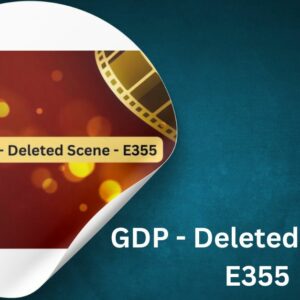The term “GDP – deleted scene – e355” intriguingly merges different contexts, combining the concept of Gross Domestic Product (GDP) with the idea of a deleted scene from a media production, specifically from “E355.”
This combination invites a deeper exploration of both economic metrics and the significance of deleted scenes in media.
In this article, we will dissect these elements, uncovering their intersections and relevance. By analyzing the term from various perspectives, we aim to provide a comprehensive understanding that goes beyond existing sources.
Understanding GDP: Gross Domestic Product
Gross Domestic Product (GDP) is a fundamental economic indicator used to gauge the economic performance of a country.
It measures the total value of all goods and services produced within a nation’s borders over a specific period. GDP is a critical tool for assessing the health of an economy, influencing policy decisions, and guiding investment strategies.
Components of GDP
GDP is typically measured using three approaches:
- Production Approach: It calculates GDP by aggregating the value added at every stage of production throughout the entire economic process.
- Income Approach: Computes GDP based on the total income earned by individuals and businesses, including wages, rents, and profits.
- Expenditure Approach: Measures GDP by aggregating total spending on final goods and services, including consumption, investment, government spending, and net exports.
Importance of GDP
GDP is crucial for several reasons:
- Economic Health:
It offers a comprehensive overview of the economic activity and overall health of a country, reflecting the total value of goods and services produced within its borders and providing insights into the nation’s economic performance and vitality.
- Policy Making:
Governments utilize GDP data as a crucial tool in the formulation of economic policies and strategies.
By analyzing this data, policymakers can make informed decisions about fiscal and monetary policies, budget allocations, and long-term economic planning.
GDP figures help guide decisions on issues such as tax rates, government spending, and investment in infrastructure, ensuring that strategies are aligned with the current state of the economy and aimed at fostering sustainable growth and stability.
- Investment Decisions:
Investors use GDP data to make informed decisions about investing in different countries or sectors.
Read: Prinlreyes – Empowering Productivity Across Domains
The Concept of a Deleted Scene
In the context of media and entertainment, a deleted scene refers to footage that was filmed but removed from the final cut of a movie or television show.
Deleted scenes often provide additional context, background, or character development that did not make it into the final version of the production.
Why Are Scenes Deleted?
Scenes might be deleted for various reasons:
- Pacing: To maintain a smooth narrative flow and avoid unnecessary distractions.
- Story Focus: To keep the story focused and coherent, removing subplots or details that do not advance the main narrative.
- Technical Issues: Due to quality concerns or technical problems with the footage.
- Time Constraints: Limited runtime can lead to the removal of non-essential scenes.
Significance of Deleted Scenes
Deleted scenes can offer valuable insights:
- Character Development: They can provide deeper understanding of characters and their motivations.
- Plot Details: They might reveal subplots or background information that enriches the story.
- Fan Interest: Deleted scenes often become a point of interest for fans, offering a glimpse into the creative process.
Exploring “E355”
“E355” appears to be a specific reference, potentially to a media production or episode that includes or features a deleted scene.
While the exact nature of “E355” is unclear without additional context, it could be a reference to a particular episode or installment in a series where the deleted scene holds significance.
Possible Interpretations of “E355”
- Episode Number: “E355” might denote an episode number in a television series where the deleted scene was originally intended.
- Production Code: It could be a production code or identifier related to the media project in question.
- Specific Context: Understanding the context of “E355” is essential to fully grasp the relevance of the deleted scene.
Read: www defstartup org – A Game Changer for Startups and Business Owners
Analyzing the Intersection: GDP and Deleted Scenes
Combining GDP with a deleted scene might seem unconventional, but there are interesting intersections:
Economic Analysis and Media Production
Understanding the economic impact of media production involves analyzing how investments in film and television contribute to GDP. This includes:
- Economic Contribution: Media production generates revenue and creates jobs, impacting the overall economy.
- Cultural Impact: Media content influences cultural trends and consumer behavior, which can be reflected in economic metrics.
Deleted Scenes as Economic Indicators
While deleted scenes themselves do not directly influence GDP, they can be part of a broader economic discussion:
- Production Costs: Deleted scenes represent part of the production process, reflecting the costs and investments made.
- Consumer Demand: Interest in deleted scenes can indicate consumer engagement with media products, influencing economic outcomes.
Personal Insights and Analysis
To gain a deeper understanding of the term “GDP – deleted scene – e355,” it is useful to consider broader implications and contexts:
Impact of Deleted Scenes on Media Value
Deleted scenes can affect the perceived value of a media production. Their inclusion or exclusion may influence audience reception and commercial success:
- Extended Editions: Deleted scenes often become part of extended or special editions, potentially driving additional sales and revenue.
- Fan Engagement: Fans may seek out deleted scenes, affecting the media’s ongoing popularity and profitability.
Economic Implications of Media Production
The media industry’s economic contributions are significant. Analyzing how elements like deleted scenes impact the industry can provide insights into broader economic patterns:
- Revenue Streams: Media productions, including those with deleted scenes, contribute to various revenue streams such as ticket sales, streaming rights, and merchandising.
- Job Creation: The production process, including editing and scene selection, creates jobs and stimulates economic activity.
FAQs
1 What is a deleted scene?
A deleted scene is footage that was filmed but removed from the final version of a movie or television show.
2 How does GDP relate to media production?
Media production contributes to GDP through revenue generation, job creation, and economic activity.
3 Why are scenes deleted from media productions?
Scenes may be deleted for pacing, story focus, technical issues, or time constraints.
4 How does consumer interest in deleted scenes affect the economy?
Interest in deleted scenes can impact media sales and engagement, influencing economic outcomes.
5 What role do deleted scenes play in media production costs?
Deleted scenes represent part of the production process, reflecting costs and investments made.
Conclusion
The term “GDP – deleted scene – e355” weaves together economic and media elements in a unique way.
By exploring the concept of GDP, understanding the significance of deleted scenes, and analyzing their intersections, we gain a richer perspective on both economic and media dynamics.
This comprehensive approach not only enhances our understanding but also highlights the multifaceted nature of seemingly unrelated concepts.
Read More:




